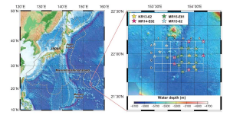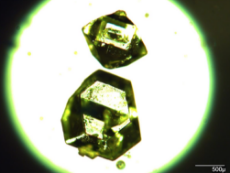A massive source of Rare Earth Metals has been discovered off the coast of Japan, which could end China's monopoly
>The newly discovered deposit is enough to "supply these metals on a semi-infinite basis to the world," the study's authors wrote in the study. There's enough yttrium to meet the global demand for 780 years, dysprosium for 730 years, europium for 620 years, and terbium for 420 years. The cache lies off of Minamitori Island, about 1,150 miles southeast of Tokyo. It's within Japan's exclusive economic zone, so the island nation has the sole rights to the resources there.
This consequential most of all because if these minerals can be extracted, China's monopoly on Rare Earth Metals will be ended.
>Japan started seeking its own rare-earth mineral deposits after China withheld shipments of the substances amid a dispute over islands that both countries claim as their own, Reuters reported in 2014.
>Previously, China reduced its export quotas of rare earth minerals in 2010, pushing prices up as much as 10%, The Journal reports. China was forced to start exporting more of the minerals again after the dispute was taken up at the World Trade Organization.
http://www.businessinsider.com/rare-earth-minerals-found-in-japan-2018-4
More on China using rare earth metals as a foreign policy tool
>In 2009, there was a brief clash between China and Japan in the East China Sea, and China decided to punish Japan and get revenge by ending shipments to Japan of rare earth minerals. This was a significant blow for Japanese manufacturing, since Japan needed these minerals for the manufacture of their high tech products, and Japan was dependent on being supplied by China. This became a major foreign policy for China.
>As Yasuhiro Kato from Tokyo University has pointed out, “Their real intention is to force foreign companies to locate plant in China. They’re saying `if you want our rare earth metals, you must build your factory here, and we can then steal your technology.”
>In 2012, China stepped up the revenge against Japan. The Beijing government encouraged the Chinese people to demonstrate and protest against Japanese businesses in China. The government urged protesters not to use violence, but that part of the message was clearly ignored, as protesters torched a Panasonic factory and Toyota dealership, looted and ransacked Japanese department stores and supermarkets in several cities.
>It became clear to the Japanese that they would need to find an alternate supply of rare earth minerals, and that is what motivated the deep-sea research project that made the initial discovery in 2013, leading to the “semi-infinite” supply of rare earths announced this week.
>The new supply of rare earths has to be described as a defeat for China, because once Japan is successful in mining this new supply, China will be unable to use rare earths as a weapon of war
http://www.breitbart.com/national-security/2018/04/13/13-apr-18-world-view-japan-finds-semi-infinite-supply-of-rare-earth-minerals-in-its-territorial-waters/
/mlpol/ - My Little Politics
Archived thread
>>140871
No, they shoud just focus on immigration and globalization, focusing on local industries is so efficient it's basically lame. It's twenty-eighteen and they need to update their policy.
No, they shoud just focus on immigration and globalization, focusing on local industries is so efficient it's basically lame. It's twenty-eighteen and they need to update their policy.
But is oil there?
>Dysprosium
Dysprosium is used in making laser materials and commercial lighting. employed in various data-storage applications, such as in hard disks
>Terbium
Terbium is used (…) in solid-state devices, and as a crystal stabilizer of fuel cells. terbium is of use in actuators, in naval sonar systems and in sensors
>Yttrium
uses of yttrium are LEDs, Yttrium is also used in the production of electrodes, electrolytes, electronic filters, lasers, superconductors, various medical applications
>Europium
A recent (2015) application of europium is in quantum memory chips which can reliably store information for days at a time
So computer storage & old style monitors.
Dysprosium is used in making laser materials and commercial lighting. employed in various data-storage applications, such as in hard disks
>Terbium
Terbium is used (…) in solid-state devices, and as a crystal stabilizer of fuel cells. terbium is of use in actuators, in naval sonar systems and in sensors
>Yttrium
uses of yttrium are LEDs, Yttrium is also used in the production of electrodes, electrolytes, electronic filters, lasers, superconductors, various medical applications
>Europium
A recent (2015) application of europium is in quantum memory chips which can reliably store information for days at a time
So computer storage & old style monitors.
>>140886
That's kinda disappointing. I was hoping we'd get to see a bunch of kikes tripping over themselves to siphon rare minerals out of the sea through their noses.
That's kinda disappointing. I was hoping we'd get to see a bunch of kikes tripping over themselves to siphon rare minerals out of the sea through their noses.
>>140888
Get a load of this…
https://phys.org/news/2016-08-metal-organic-frameworks-hot-material-nature.html
I was talking with a aquianted chemist. He told me those thingies can regenerate under high temperature. Imagine… weave them into metal armor of battle-tanks.
Get a load of this…
https://phys.org/news/2016-08-metal-organic-frameworks-hot-material-nature.html
I was talking with a aquianted chemist. He told me those thingies can regenerate under high temperature. Imagine… weave them into metal armor of battle-tanks.
>>140935
Allegedly, yes. Ironically, they'd be more developed than south korea because of it if they weren't communists.
Allegedly, yes. Ironically, they'd be more developed than south korea because of it if they weren't communists.
The United States has a large reserve of rare earth materials with the potential to rival China as well as revive the mining industry without the environmental, financial strain of coal. Simply put into the equation thorium nuclear reactors.
[YouTube] Rare Earth Elements - House of Cards IRL![]()
[YouTube] Rare Earth Elements - House of Cards IRL
>>141053
Beat me to it.
There is no shortage of rare earth deposits, the problems are first international regulation - rare earths are chemically similar to and found together with thorium, which means OMG NUKES and lots of trouble for anyone who wants to extract them in the west. Not a problem in China.
Second problem is, I believe, that separating rare earths from each other is difficult and involves processes that tends to pollute the environment pretty significantly. Not a problem in China.
Third problem is China. They have the capability to drive prices so low that nobody that operates under free market constraints can compete, and they have used this quite deliberately to force out competition. They have also made purchases of rare earths conditional on setting up manufacturing in China - and now they take one step up the manufacturing ladder and start to corner the market on products that use rare earths, not just the elements themselves.
So yeah, you can open a mine, but all the infrastructure to process ore into elements are gone, and you have to depend on China anyway.
Japan might be the exception. They might feel threatened enough to actually start up the whole rare earths chain just to keep their electronics industry alive and not under the control of a country that can cut them off at any time. Or China will just start shipping to them again.
Beat me to it.
There is no shortage of rare earth deposits, the problems are first international regulation - rare earths are chemically similar to and found together with thorium, which means OMG NUKES and lots of trouble for anyone who wants to extract them in the west. Not a problem in China.
Second problem is, I believe, that separating rare earths from each other is difficult and involves processes that tends to pollute the environment pretty significantly. Not a problem in China.
Third problem is China. They have the capability to drive prices so low that nobody that operates under free market constraints can compete, and they have used this quite deliberately to force out competition. They have also made purchases of rare earths conditional on setting up manufacturing in China - and now they take one step up the manufacturing ladder and start to corner the market on products that use rare earths, not just the elements themselves.
So yeah, you can open a mine, but all the infrastructure to process ore into elements are gone, and you have to depend on China anyway.
Japan might be the exception. They might feel threatened enough to actually start up the whole rare earths chain just to keep their electronics industry alive and not under the control of a country that can cut them off at any time. Or China will just start shipping to them again.
15 replies | 5 files | 1 UUIDs | Archived





 Ex: Type :littlepip: to add Littlepip
Ex: Type :littlepip: to add Littlepip  Ex: Type :eqg-rarity: to add EqG Rarity
Ex: Type :eqg-rarity: to add EqG Rarity 